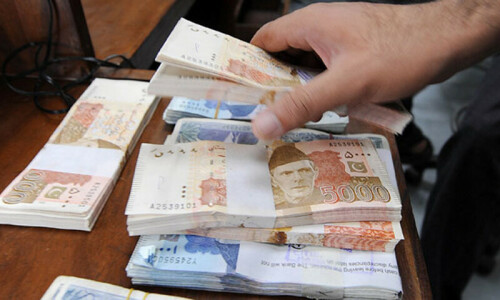KARACHI: Liquidity flow from banks to the private sector has changed dramatically, with advances surging to Rs447 billion in the first four months of this fiscal year, compared to a net debt retirement of Rs153 billion in the corresponding period last year.
Experts said the surplus liquidity in the government’s account and the steep fall in the interest rate have changed banking in Pakistan.
The government is borrowing cautiously after receiving an injection of Rs2.7 trillion from the State Bank of Pakistan (SBP) in profits. This surplus liquidity allowed the government to reject almost all bids for treasury bills and started borrowing relatively for longer tenors less than the auction targets.
The government’s borrowing strategy change has created a liquidity surplus, compelling banks to lend excessively to the private sector.
Against net debt retirement, businesses borrow Rs447bn in July-September quarter
A sharp decline in the SBP policy rate was a critical factor that forced banks to extend loans to private businesses. The central bank has slashed the benchmark interest rate by 700 basis points to 15pc since June 2024 from an unprecedented level of 22pc.
Bankers said big companies were borrowing at rates lower than the SBP policy rate. The unused liquidity is a loss to the banks. The Karachi Interbank Offered Rate (Kibor) is around 13pc, reflecting the real interest rate prevailing in the market.
Since the main inflation stood at 7.2pc in October, the real interest rate is still 7.8pc positive, suggesting ample room for further cuts. Trade and industry leaders have asked the central bank to reduce the policy rate to a single digit as CPI-based inflation witnessed faster-than-expected deceleration.
According to the SBP data, the conventional banks took the lead in by extending Rs249.5bn loans to the private sector during July-October FY25 against a net debt retirement of Rs108.5bn in the same period last year.
For the last two years, the banks were not lending to the private sector, which led to a contraction in the economy in FY23. The government has projected a GDP growth of 2.5 to 3.5pc in the current fiscal year.
The Islamic banks also changed the trend and extended credits worth Rs200.8bn to the private sector in 4MFY25 against a net debt retirement of Rs45.5bn last year.
However, Islamic banking branches of conventional banks failed to improve their performance, showing a net debt retirement of Rs3.2bn against lending of Rs594 million in the same period last year.
The bank advances to the private sector in 4MFY25 were higher than the lending in the entire FY24 (Rs364bn) and FY23 (Rs208bn).
The changing trend could bring higher economic growth, provided the government reduces bank borrowings. However, the FBR has failed to chase the target as tax collection fell significantly, which may compel the government to borrow again from banks.
Collection in the first four months of FY25 stood at Rs3.442tr, a shortfall of Rs190bn or 5.23pc compared to the estimated target of Rs3.632tr for July-October.
Published in Dawn, November 10th, 2024














































Dear visitor, the comments section is undergoing an overhaul and will return soon.